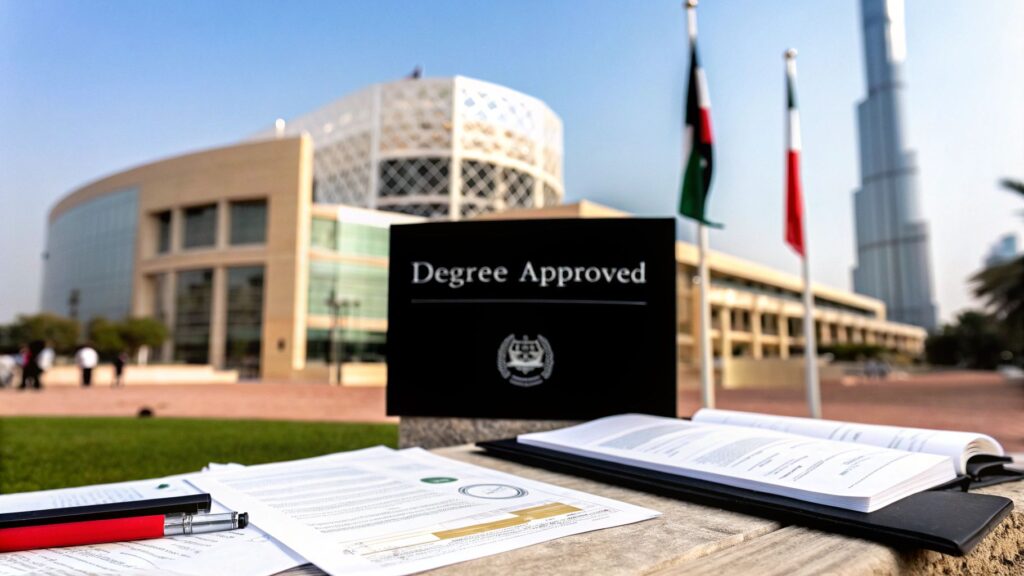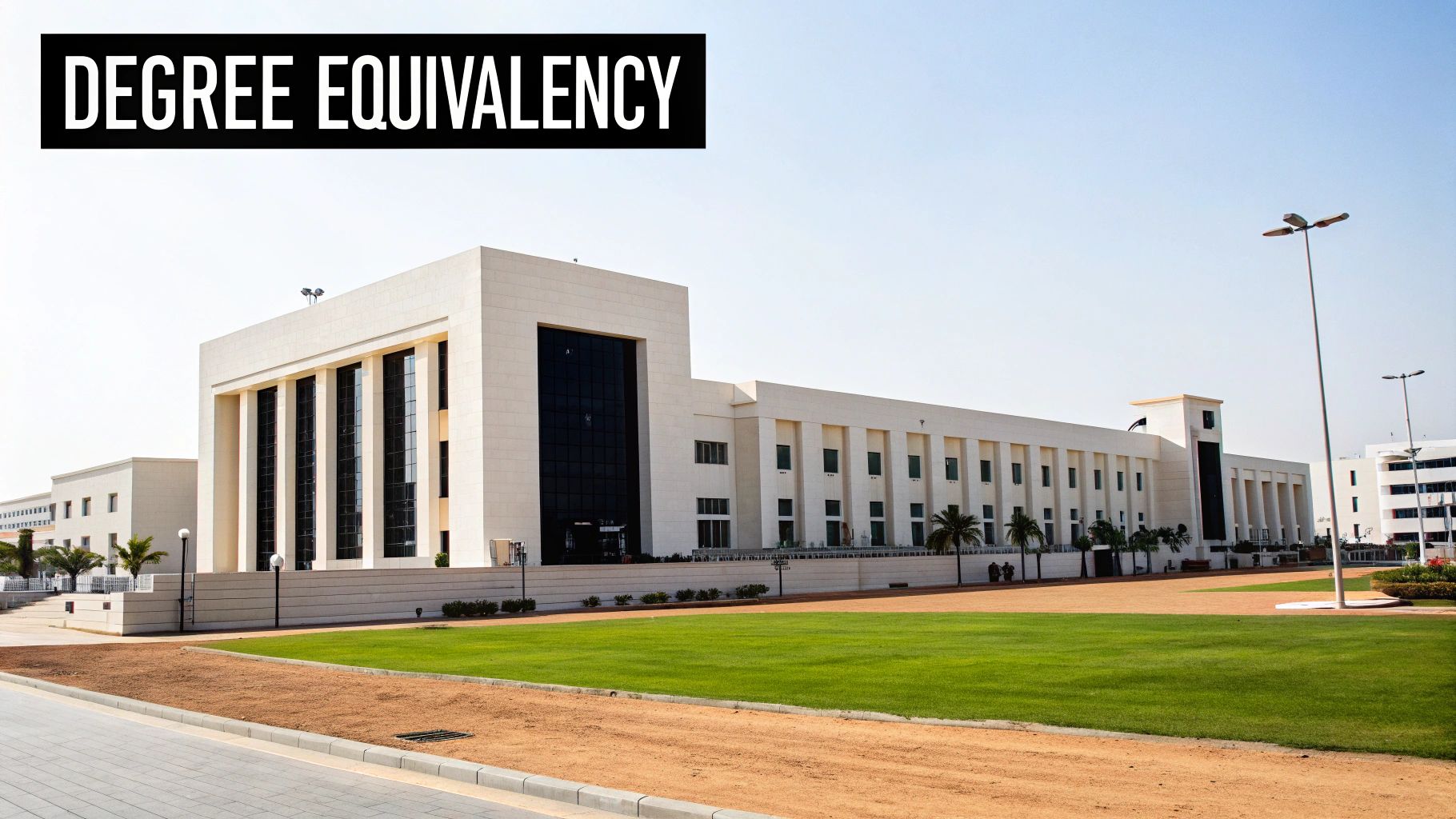
Degree Equivalency UAE: Swift Document Approval
Navigating UAE Degree Equivalency: What Professionals Need to Know

Securing a job in the competitive UAE market often depends on the recognition of your international degree. This process, known as degree equivalency UAE, is a vital step for many professionals. It validates your educational credentials for employers and educational institutions within the Emirates. Understanding this process is essential for career advancement in the UAE.
Degree equivalency confirms that your international education aligns with UAE standards. This involves verifying your academic documents’ authenticity and your university’s reputation. Your degree certificate and transcripts are reviewed to ensure they are genuine. The Ministry of Education also assesses the standing of the institution that awarded your degree.
This evaluation ensures a consistent standard of education across the UAE workforce. It allows employers to compare qualifications from different global educational systems fairly. This creates a level playing field for international professionals. Degree equivalency also opens doors to further education in the UAE. Learn more about degree equivalency.
Understanding The Importance of Degree Equivalency
Certain professions in the UAE require degree equivalency. Roles in healthcare, engineering, and education often mandate this certification. This ensures professionals in these fields meet specific educational benchmarks. Many private sector employers also prefer candidates with attested degrees, demonstrating a commitment to quality.
The Ministry of Education primarily handles validating educational credentials in the UAE. However, certain free zones may have their own requirements. Understanding the specific regulations of your target industry or employer is crucial. The timeframe for recognition can vary, depending on factors like university ranking and documentation complexity. The process typically takes between 10 to 30 working days.
Key Considerations For UAE Degree Equivalency
Successfully navigating degree equivalency requires planning and preparation. Ensure all your documents—degree certificate, transcripts, and potentially high school certificates—are attested. Accurate, certified translations are essential if your original documents aren't in English or Arabic.
Be prepared for verification queries from the Ministry of Education. Prompt and thorough responses can expedite the process. Maintaining organized records of your application and supporting materials will also help you stay on track. Understanding these key elements can help you confidently pursue degree equivalency and unlock your career potential in the UAE.
The Certificate Recognition System in UAE

The UAE has significantly changed how it recognizes international degrees. This impacts how professionals seeking degree equivalency navigate the validation process. The introduction of the University Certificates Recognition system marks a new era for those looking to establish their credentials in the Emirates.
This new system replaces the previous University Qualification Equivalency system. This change reflects the UAE's commitment to attracting and retaining global talent. It simplifies the process for individuals with degrees from reputable international institutions. The UAE implemented these changes on June 22, 2023, with the goal of streamlining the recognition of foreign university certificates. It eliminates requirements like physical presence and credit transfer limits for many degrees, offering increased flexibility. Find more detailed statistics here. The new system primarily focuses on the issuing university's ranking.
How University Ranking Impacts Recognition
The new system prioritizes the global standing of the university granting the degree. For graduates of top-tier universities, the path to recognition is now much smoother. This emphasis on university ranking streamlines the process and reflects the UAE's focus on workforce quality.
This focus on ranking has significant implications for recent graduates and seasoned professionals. Graduates from highly ranked universities can expect faster processing and potentially fewer required documents. This allows them to enter the UAE job market or pursue further education more quickly. For established professionals, this simplifies the often complex validation process.
Benefits of the New System
The new system offers several key benefits for those seeking degree equivalency in the UAE:
- Elimination of Physical Presence Requirements: Applicants no longer need to be physically present in the UAE.
- Relaxed Credit Transfer Policies: Credit transfer limitations for certain degrees have been eased.
- Faster Processing for Top-Ranked Universities: Graduates from globally recognized institutions benefit from expedited processing.
These changes create a more efficient and flexible system. This reflects the UAE’s dedication to welcoming international talent. The ranking-based system elevates the importance of educational quality and encourages pursuing degrees from reputable institutions. The system also benefits employers by ensuring a highly qualified talent pool.
Practical Implications for Professionals
The new system presents significant opportunities for professionals looking to work or study in the UAE. It highlights the value of a degree from a globally recognized university. This encourages prospective students to consider university rankings when making educational choices. It also simplifies the validation process for those with degrees from top-tier institutions. This makes the UAE an even more attractive destination for talented professionals worldwide. The new system supports a diverse and highly skilled workforce, driving the UAE's continued economic development.
Mastering the Degree Equivalency UAE Process: Step by Step

Obtaining degree equivalency in the UAE can feel overwhelming. However, understanding the steps involved simplifies the entire procedure. This guide offers practical advice for successfully navigating the degree equivalency UAE process, enabling you to approach each stage with confidence.
Preparing Your Documents
A successful application hinges on careful document preparation. Several key steps are essential:
-
Attestation: Verify the authenticity of your degree certificate and transcripts by having them attested by relevant authorities in your home country and the UAE Embassy.
-
Translation: If your documents are not in Arabic or English, obtain certified translations that adhere to UAE requirements. Accurate translation is critical.
-
Organization: Arrange all required documents, including attested degree certificate, transcripts, and possibly high school certificates, clearly and systematically. This helps expedite the review.
Thorough preparation minimizes delays. A well-organized application reflects professionalism and ensures a smoother process, setting a positive tone for the outcome.
Navigating the Online Application Portal
The UAE Ministry of Education employs an online portal for degree equivalency applications. Familiarizing yourself with the portal's interface and requirements beforehand can save you time and prevent errors.
-
Account Creation: Start by setting up an account on the portal. Ensure all personal and academic information you provide is accurate.
-
Document Upload: Upload clear, scanned copies of your attested and translated documents, making sure they comply with specified file size and format restrictions.
-
Application Submission: Double-check all entered data and uploaded files before submitting your application. Accuracy is paramount.
You can track your application's progress through the portal once it's submitted. This allows you to stay informed and promptly address any additional information requests.
Addressing Verification Queries and Following Up
The Ministry of Education may require further verification or details during their review. Respond promptly and comprehensively to any inquiries, as this can significantly influence the processing time.
-
Check Your Status Regularly: Keep an eye on your application status online and have additional documentation readily available if needed.
-
Respond Promptly: Address any communication from the Ministry swiftly, answering all questions and resolving concerns completely.
-
Keep Records: Maintain copies of all submitted materials and correspondence for your reference.
To help you visualize the required documents based on your degree type, we have provided a comprehensive table below.
A well-organized approach is key to efficiently navigating the degree equivalency process in the UAE.
Document Requirements for UAE Degree Equivalency
| Document Type | Bachelor's Degree | Master's Degree | Doctoral Degree | Special Notes |
|---|---|---|---|---|
| Attested Degree Certificate | Required | Required | Required | Attestation must be from both home country and UAE Embassy |
| Attested Transcripts | Required | Required | Required | Attestation must be from both home country and UAE Embassy |
| Certified Translations (if applicable) | Required | Required | Required | Only required if original documents are not in Arabic or English |
| High School Certificate | May be required | May be required | May be required | Check with the Ministry of Education for specific requirements. |
| Passport Copy | Required | Required | Required | Clear copy of the photo page |
| Passport-sized photos | Required | Required | Required | Recent photos meeting UAE specifications |
| Emirates ID (if applicable) | Optional | Optional | Optional | If you have an Emirates ID, it's helpful to include it. |
This table summarizes the essential documents needed for each degree level. Refer to the official Ministry of Education website for the most current requirements.
By following these steps diligently, you can ensure a smoother, more efficient process, increasing your prospects for a successful outcome. Achieving degree equivalency opens doors to various opportunities in the UAE, from employment prospects to further education.
Country-Specific Strategies for UAE Degree Equivalency Success

Your country of origin plays a significant role in the degree equivalency process for the UAE. Different national education systems have unique characteristics. These influence how UAE authorities evaluate international credentials. This section explores the specific challenges and opportunities for graduates from various regions.
Navigating Region-Specific Requirements
Degrees from certain countries might receive additional scrutiny. This can be due to variations in educational standards or prior issues with fraudulent documentation. For example, degrees from some regions may require more extensive verification. This proactive approach can prevent delays and ensure a smoother process. Addressing potential concerns upfront demonstrates thoroughness and commitment, which can lead to a more positive outcome.
Bilateral agreements between the UAE and your home country can also impact the process. These agreements may establish streamlined pathways or specific considerations. This could translate to faster processing times or fewer required documents for graduates from these nations. Understanding these nuances is crucial for a successful application. It allows applicants to tailor their approach and improve their chances of a positive result.
Targeted Strategies for Various Nations
Navigating the UAE's degree equivalency process requires a targeted approach based on your educational background. Graduates from the US and UK, for instance, often benefit from the well-regarded reputations of their education systems. However, ensuring proper attestation of documents is still critical.
Graduates from India, Pakistan, and the Philippines should prioritize meticulous document preparation. This includes clear and accurate translations. For graduates from Australia and various European and African nations, understanding the specific requirements of the UAE Ministry of Education is paramount.
Thoroughly researching these requirements can prevent delays and contribute to a successful application. Careful preparation significantly impacts the outcome.
To help visualize the varying requirements and potential challenges, let's examine a comparison of several countries:
Country-Specific Degree Equivalency Requirements
| Country | Special Requirements | Typical Processing Time | Common Issues | Success Tips |
|---|---|---|---|---|
| US/UK | Proper attestation of documents | Relatively quick | Rarely any issues | Ensure documents are notarized and attested by relevant authorities |
| India/Pakistan/Philippines | Meticulous document preparation, accurate translations | Can vary, sometimes longer | Translation discrepancies, document verification delays | Use certified translators, follow up with universities for timely verification |
| Australia/European/African Nations | Adherence to specific Ministry of Education requirements | Can vary | Unfamiliarity with specific UAE requirements | Research and understand all requirements thoroughly before applying |
This table summarizes some key differences in the equivalency process, demonstrating the importance of understanding your country-specific requirements. Understanding these differences can save you time and frustration.
Overcoming Common Hurdles
Even with the updated system, certain challenges can still arise during the degree equivalency process. Being aware of these common issues can help you prepare and address them effectively.
-
Verification Delays: University verification can sometimes take longer than anticipated. Maintaining open communication with your alma mater can help expedite the process.
-
Document Authentication Issues: Ensuring all documents are correctly attested by relevant authorities is crucial. Carefully review and confirm all attestation requirements to avoid delays and maintain compliance.
-
Language Barriers: If your documents are not in English or Arabic, accurate translations are mandatory. Using certified translation services will ensure your documents are accepted.
Proactively addressing these common issues is essential for a successful outcome. By taking these steps, you can simplify the process and ensure a smoother experience.
Leveraging Your Recognized Degree For Career Advancement
Having your degree recognized through the degree equivalency UAE process is a crucial first step. The true value, however, lies in understanding how to leverage this recognition for career advancement within the UAE. This involves strategically showcasing your validated credentials to potential employers and understanding how equivalency impacts various aspects of your professional life.
For instance, certain sectors in the UAE place significant importance on degree equivalency. Industries like healthcare, engineering, and education often require it. Many multinational companies operating in the UAE also prioritize candidates with recognized degrees, indicating a commitment to globally recognized standards. This provides a competitive advantage in the job market and can positively influence salary negotiations. Equivalency can also create opportunities for higher-level positions and specialized roles.
This recognition extends beyond immediate employment, influencing visa options and residency pathways. A recognized degree can strengthen your application for long-term residency, contributing to overall stability and integration within the Emirates. It also establishes a solid base for pursuing further education or professional certifications within the UAE, enhancing your long-term career prospects. For more information about tertiary education rates in the UAE, find detailed statistics here.
Showcasing Your Credentials
Maximizing the impact of your recognized degree requires strategically presenting it to potential employers. During job interviews, emphasize your equivalency and explain its alignment with the role's specific requirements and the company's values.
-
Resume and Cover Letter: Clearly indicate that your degree has been granted equivalency by the UAE Ministry of Education.
-
LinkedIn Profile: Update your profile to reflect your recognized credentials.
-
Portfolio (if applicable): Include your equivalency certificate within your professional portfolio.
This demonstrates your preparedness and commitment to working in the UAE, reassuring employers that your qualifications meet the required standards.
Equivalency's Impact On Remote Work and Digital Nomad Opportunities
The UAE's business landscape is continually changing, with increasing remote work and digital nomad opportunities. Degree equivalency remains important in this context, providing a standardized measure of your qualifications regardless of location.
Many remote positions in the UAE, particularly in regulated industries, still require degree equivalency. Having your degree recognized can significantly expand your remote work options and enable you to participate in the growing digital economy within the Emirates. This offers greater flexibility and career mobility in the dynamic UAE job market.
Continuously Leveraging Your Recognition
After achieving degree equivalency, it’s important to continue leveraging this recognition throughout your career. During performance reviews, demonstrate how your validated credentials have contributed to your achievements and professional growth. This reinforces the value of your qualifications and shows your continued commitment to professional development within the UAE.
By strategically presenting your validated credentials and understanding the wider implications of degree equivalency, you can use your recognized degree as a powerful tool for career advancement in the UAE. This allows you to access opportunities, negotiate effectively, and build a successful and fulfilling career in the Emirates.
Overcoming Degree Equivalency UAE Roadblocks: Expert Solutions
The UAE's degree equivalency process can sometimes present challenges. Understanding these potential roadblocks is crucial for a successful outcome. This section addresses common issues and offers expert solutions to help you navigate the process.
Addressing Verification Delays
One common hurdle is delays in university verification. This can stem from administrative backlogs or changes in university staff. To minimize delays, maintain proactive communication with your university's registrar or alumni office. Provide all necessary information upfront and follow up regularly. For instance, clearly outlining the UAE’s requirements to your university can prevent misunderstandings and expedite their response.
Navigating Document Authentication Issues
Another frequent challenge involves proper document authentication. The UAE requires specific attestation procedures, which can vary depending on your country of origin. Thoroughly research these requirements. Ensure your documents are attested by the appropriate authorities in both your home country and the UAE Embassy. This meticulous approach can prevent delays caused by incorrect or incomplete attestations.
Constructing Compelling Appeals
Applications can sometimes face initial rejection due to missing documents or discrepancies in the provided information. If your application is rejected, carefully review the reasons given by the Ministry of Education. Craft a well-structured appeal, addressing each point clearly and providing all requested supporting documentation. A well-presented and factual appeal can greatly improve your chances of reconsideration.
Exploring Alternative Pathways
If traditional degree equivalency proves difficult, alternative pathways may exist. These might include pursuing supplementary qualifications or professional certifications recognized in the UAE. Researching these options and choosing a path aligned with your career goals can provide a valuable alternative. This allows you to continue advancing your career while addressing the equivalency challenges.
Specialized Solutions for Unique Cases
Graduates of institutions that have merged, closed, or changed names may face more complex documentation requirements. Contacting the relevant educational authorities or successor institutions is vital to obtain the required verification. Clearly explaining your situation to the Ministry of Education and providing all available supporting evidence is essential. Validating online, hybrid, and non-traditional learning credentials also requires a strategic approach. Focus on providing complete documentation outlining the program's curriculum, learning outcomes, and accreditation status. This thorough approach helps the Ministry of Education evaluate these non-traditional learning experiences.
By understanding these potential roadblocks and applying the strategies outlined above, you can navigate the degree equivalency process with greater confidence. Ready to advance your career? Explore professional development courses offered by National Academy to further your skills and unlock new opportunities in the UAE.